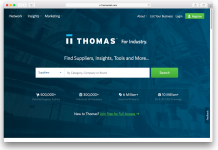With over 22,000 customers spanning more than 100 countries, Route4Me is the world’s most used route optimization software. Their mobile apps have been downloaded almost 2,000,000 times since 2009.
One of the keys to Route4Me’s success is that they don’t operate out of a single centralized office. All of their team members work remotely from a home office or a coworking space. Because Route4Me’s team members are globally distributed, a unique perspective is applied to solve a truly global challenge.
Distributed Teams Are Catching On Everywhere
Of course, Route4Me is far from the only company that’s set up like this. The popularity of distributed remote teams has grown steadily since the internet went mainstream in the 1990s.
Many businesses, including Buffer, Zapier, and Automattic (the creator of WordPress), have most or all of their team members working remotely. Even major corporations like Amazon, Xerox, and Dell have jumped on the telecommuting bandwagon. According to the London Business School, the majority of the global workforce will be working remotely by 2020.
Distributed Team Benefits Are Many
It’s easy to see why Route4Me and so many other companies have embraced distributed teams. The benefits include faster hiring speed, lower costs, improved productivity, and more.
A Bigger Talent Pool
When a business operates exclusively out of a physical location, recruiting is limited primarily to people who are in close proximity and have a reasonable commute time. However, with distributed teams, recruiting options broaden significantly because a global talent pool is being accessed. Many talented individuals do not wish to relocate because of personal or family restrictions, such as an elderly parent or children in school. When this physical constraint is removed, highly talented individuals become available.
At the same time, not every candidate is going to be the best fit for a remote company. People who are used to working in a centralized office may have trouble adjusting. Route4Me avoids this issue by looking for candidates who already have experience working remotely. That way, new team members are ready to hit the ground running. Communication frameworks within a company should be designed to onboard and train people regardless of location.
A Happier Team
Most people don’t like adjusting their personal lives to a traditional 9-to-5 work schedule. Even those who love their job and are passionate about have a personal life that includes friends and family. They’d rather schedule their work around their personal lives. In a results and outcomes driven business environment, and with the exception of some team meetings, do working hours truly matter?
That’s exactly what remote work allows Route4Me’s team members to do. Route4Me requires their full-time team members to produce deliverables that meet expectations, but it’s up to each team member to decide how they get that done. They have the freedom to enjoy more time with their friends and family, and a happier team will make it easier for you to retain your top talent.
Improved Productivity
Working at a traditional office involves many time-wasting activities. First, there’s the commute. Team members might spend an hour or more every day just driving to and from work. Then, there are all the little distractions, office games, or someone’s birthday party. While these things are amazing for building team camaraderie, they have a serious impact on performance. Plus, not everyone thrives working in an environment full of external stimuli. Certain types of highly precise work benefit greatly from a peaceful ambiance.
Route4Me doesn’t need to deal with any of this. Their remote workers have more time and attention to dedicate to their work, in a setting comfortable and customized by them for themselves.
Some argue that communication is more challenging with remote teams. Yet, popular communications apps and collaboration tools like Slack can be used keep everyone on the same page. Route4Me also uses JIRA and G Suite for project collaboration. With the right tools, managing a fully remote workforce and keeping everyone connected is often more effective and controlled than in a physical environment.
An Open Door Policy
In many larger organizations, it’s difficult for most workers to reach out to the CEO of their company. They are often advised to raise concerns with their immediate supervisor and hope that their message gets relayed upstairs. Route4Me has an open door policy that removes any gaps or miscommunication within the organization. Team members can ask questions, give complaints, or say anything else to the CEO directly through Slack or email. This improves morale, reduces turnover, and aligns with the company’s flat corporate hierarchy.
Always Available
Route4Me’s business leadership team is based in the U.S., but the company doesn’t completely close during night hours in the U.S. or during U.S. holidays. They have team members in many other countries as well. When one team member is getting ready to go to sleep, another is just starting their day. So, whenever there’s an emergency, Route4Me can respond quickly. There’s always someone available.
Diversity Encourages Creativity
In addition to increasing productivity, distributed remote teams also increase diversity innovation. This is because many of the social biases that happen unknowingly during the typical in-person interview process do not occur. All decisions regarding collaboration with a team member and the company become linked only to performance and results.
Having a team, especially one that has low diversity, in one city results in ideas that are too similar. On the other hand, a team consisting of global experts, breeds innovation. Creative thinking thrives in a distributed working environment. Route4Me has people from different backgrounds with different perspectives, which has allowed them to build a well-rounded and extremely popular product. While challenging at first, it can do the same for almost any company, too.
Find a Home-Based Business to Start-Up >>> Hundreds of Business Listings.

















































